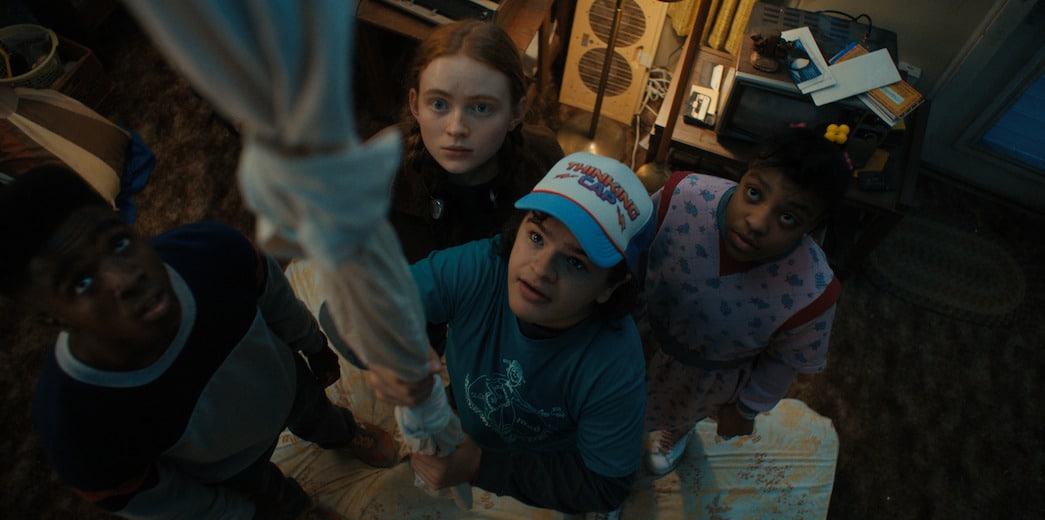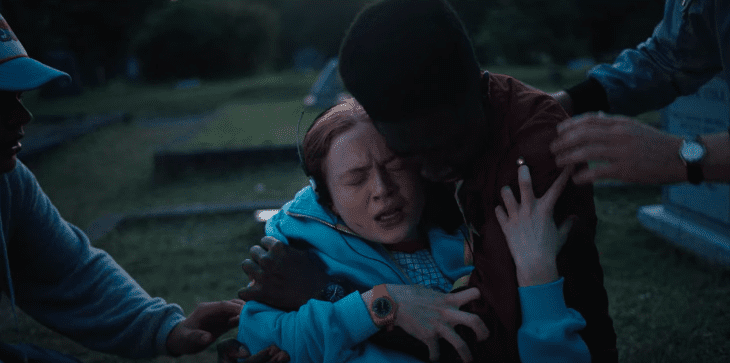Netflix’s record-breaking sci-fi hit, Stranger Things, gained over 700 million views in the first 28 days of season 4’s release. There are many reasons for the popularity of season 4. Perhaps part of the show’s success is due to its unique character development through relatable experiences such as coping with trauma.
Although the quaint, fictional town of Hawkins has undergone great destruction throughout seasons 1-3, season 4 takes these traumatic experiences to a new level. The villain, Vecna, preys on and consumes the minds of teenagers who have experienced some kind of personal trauma, resulting in feelings of guilt and shame. Max Mayfield (Sadie Sink) discovers this fact by sneaking into her school counselor’s office and looking through files of troubled students who visit regularly.
How Season 4 Depicts PTSD
PTSD, or Post Traumatic Stress Disorder, can be defined as the long-lasting result of experiencing a traumatic event. According to the National Library of Medicine, The Diagnostic and Statistical Manual of Mental Disorders says that a traumatic event could be “actual or threatened death, serious injury, or sexual violence, whether personally experienced, or witnessed, or experienced vicariously.”
Max shows several common symptoms of PTSD when she has flashbacks to her step-brother’s death in season 3. The National Library of Medicine would call this “re-experiencing the event.” Max also experiences survivor’s guilt and a feeling of responsibility. The final episode further depicts these symptoms when Max confesses to Vecna that deep down, she wanted Billy to die and feels as if it is her time to go too.
How Common is PTSD in Teens?
According to the National Center for PTSD: “About 15% to 43% of girls and 14% to 43% of boys go through at least one trauma.” Although not every child who goes through trauma experiences the symptoms of PTSD, “child protection services in the U.S. get around three million reports each year.”
Tori Talbert, a Texas-certified school counselor says that during the course of her career, she has worked with between 25 to 30 students who have been diagnosed with PTSD. She has also referred between 50 and 75 children who have exhibited symptoms. Talbert explains:
“Their reaction can be self-doubt and self-loathing and pushing people away. Relationships and healthy boundaries can be a huge challenge.”
Max shows this kind of behavior when she chooses to isolate herself while feeling overwhelmed by guilt. This information should cause us to seek a better understanding of PTSD, and Stranger Things provides these opportunities to have open conversations about this mental disorder.
The Power of Music and Relationships
Despite the darkness of Vecna’s power, our heroes discover that they can help Max escape Vecna’s psychological grasp by playing her favorite song, “Running Up That Hill” by Kate Bush, on her Walkman. When she hears this song, Max sees an opening in her mind, leading to joyful memories involving Lucas, Eleven, and her other close friends. As a result, she runs toward this light and pushes Vecna out.
Scientific evidence supports Max’s way of coping with PTSD through music. According to the National Library of Medicine, music has become an effective tool for helping people overcome trauma over the past ten years. Trauma victims of events such as the Black Saturday fires in Australia and the September 11th attacks have undergone music therapy to help them cope and process their experiences.
The National Library of Medicine continues, “Music therapy researchers argue that the benefits of musical activity include: mood improvement, self-expression, catharsis, facilitating grieving, relaxation, reflection, socialization, community building, stress reduction, and more.”
Perhaps this therapy’s success is because of the relationship between music and memory. The Journal of Biology explains how scientific studies have confirmed this connection: “Hearing music associated with our past often evokes a strong ‘feeling of knowing.’” Max experiences this connection when she hears her favorite song and remembers her relationships and the depth of love she’s known as a result.
“Hearing music associated with our past often evokes a strong ‘feeling of knowing.'”
The BioMed Central Journal of Biology
The most beautiful part of this season is not Max’s victory over Vecna but her ability to overcome trauma. Max finds healing through music as an avenue to rediscover the love and support she receives from her friends. The final moments of season 4 depict her recovery as complex and maybe even impossible, but hope remains. In the end, Stranger Things illustrates how we can use the tools of music and community to overcome trauma in real life, not just in the Upside Down.















